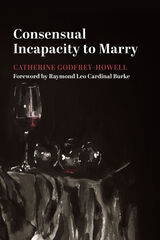
Free and informed consent is one of the most widespread and morally important practices of modern health care; competence to consent is its cornerstone. In this book, Becky Cox White provides a concise introduction to the key practical, philosophical, and moral issues involved in competence to consent.
The goals of informed consent, respect for patient autonomy and provision of beneficent care, cannot be met without a competent patient. Thus determining a patient's competence is the critical first step to informed consent. Determining competence depends on defining it, yet surprisingly, no widely accepted definition of competence exists. White identifies nine capacities that patients must exhibit to be competent. She approaches the problem from the task-oriented nature of decision making and focuses on the problems of defining competence within clinical practice. Her proposed definition is based on understanding competence as occurring in a special rather than a general context; as occurring in degrees rather than at a precise threshold; as independent of consequential appeals; and as incorporating affective as well as cognitive capacities.
Combining both an ethical overview and practical guidelines, this book will be of value to health care professionals, bioethicists, and lawyers.

The anthropology that supports marriage perceives justice to be a particular reality, and for this reason marriage will always be a subject of law and of great interest to jurists and sociologists alike. With respect to the realization of justice in marriage, understood as the moment the bond is created, Catholic ecclesiology and canon law articulate an original legal category––namely, the consensual incapacity to marry. In the last fifty years, however, and despite the juridical innovations provided by the current Code of Canon Law promulgated in 1983, American canonical practice in the sphere of marriage law has lost its foundation. The consequences of this include mechanisms of judgment that are rendered incoherent although not inactive, particularly in local tribunals reviewing claims of marriage nullity. In other words, the application of law in the Catholic Church moves forward without a clear indication of its anthropological basis. Canon law, then, on the issue of marriage is perceived to be purposefully oppressive or absolutely meaningless.
Jurists, scholars, and members of the Roman Curia acknowledge that, more than a general response to this crisis of law and marriage, what might be needed most is greater scrutiny of the canon in which the formula for consensual incapacity appears. It is furthermore acknowledged that American canonical practice is perhaps the most influential in the world, and is responsible for shaping and sustaining the global attention given to this issue. To fully grasp the crisis and the best way forward, a profile of this canon in American jurisprudence is fundamental and demanded presently. The new course charted by canonical studies and formation of jurists, as well as the new developments in ecclesiastical legislation, will find guidance in this study provided by Catherine Godfrey-Howell, and further insight in the foreword given by the American Cardinal prelate and former Prefect of the Apostolic Signatura, Raymond Leo Cardinal Burke.
READERS
Browse our collection.
PUBLISHERS
See BiblioVault's publisher services.
STUDENT SERVICES
Files for college accessibility offices.
UChicago Accessibility Resources
home | accessibility | search | about | contact us
BiblioVault ® 2001 - 2024
The University of Chicago Press









